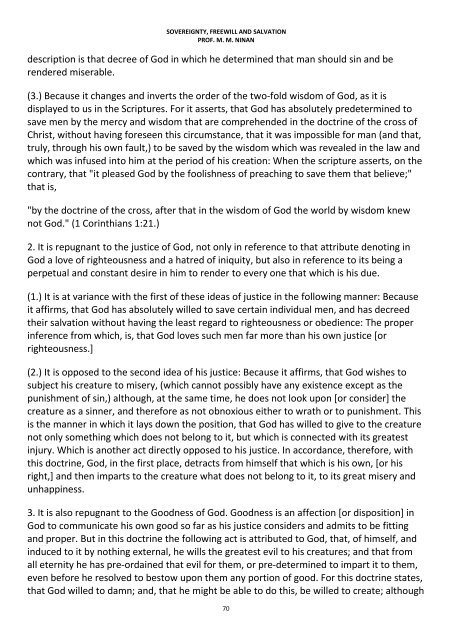Calvinism and Arminianism
You also want an ePaper? Increase the reach of your titles
YUMPU automatically turns print PDFs into web optimized ePapers that Google loves.
SOVEREIGNTY, FREEWILL AND SALVATION<br />
PROF. M. M. NINAN<br />
description is that decree of God in which he determined that man should sin <strong>and</strong> be<br />
rendered miserable.<br />
(3.) Because it changes <strong>and</strong> inverts the order of the two-fold wisdom of God, as it is<br />
displayed to us in the Scriptures. For it asserts, that God has absolutely predetermined to<br />
save men by the mercy <strong>and</strong> wisdom that are comprehended in the doctrine of the cross of<br />
Christ, without having foreseen this circumstance, that it was impossible for man (<strong>and</strong> that,<br />
truly, through his own fault,) to be saved by the wisdom which was revealed in the law <strong>and</strong><br />
which was infused into him at the period of his creation: When the scripture asserts, on the<br />
contrary, that "it pleased God by the foolishness of preaching to save them that believe;"<br />
that is,<br />
"by the doctrine of the cross, after that in the wisdom of God the world by wisdom knew<br />
not God." (1 Corinthians 1:21.)<br />
2. It is repugnant to the justice of God, not only in reference to that attribute denoting in<br />
God a love of righteousness <strong>and</strong> a hatred of iniquity, but also in reference to its being a<br />
perpetual <strong>and</strong> constant desire in him to render to every one that which is his due.<br />
(1.) It is at variance with the first of these ideas of justice in the following manner: Because<br />
it affirms, that God has absolutely willed to save certain individual men, <strong>and</strong> has decreed<br />
their salvation without having the least regard to righteousness or obedience: The proper<br />
inference from which, is, that God loves such men far more than his own justice [or<br />
righteousness.]<br />
(2.) It is opposed to the second idea of his justice: Because it affirms, that God wishes to<br />
subject his creature to misery, (which cannot possibly have any existence except as the<br />
punishment of sin,) although, at the same time, he does not look upon [or consider] the<br />
creature as a sinner, <strong>and</strong> therefore as not obnoxious either to wrath or to punishment. This<br />
is the manner in which it lays down the position, that God has willed to give to the creature<br />
not only something which does not belong to it, but which is connected with its greatest<br />
injury. Which is another act directly opposed to his justice. In accordance, therefore, with<br />
this doctrine, God, in the first place, detracts from himself that which is his own, [or his<br />
right,] <strong>and</strong> then imparts to the creature what does not belong to it, to its great misery <strong>and</strong><br />
unhappiness.<br />
3. It is also repugnant to the Goodness of God. Goodness is an affection [or disposition] in<br />
God to communicate his own good so far as his justice considers <strong>and</strong> admits to be fitting<br />
<strong>and</strong> proper. But in this doctrine the following act is attributed to God, that, of himself, <strong>and</strong><br />
induced to it by nothing external, he wills the greatest evil to his creatures; <strong>and</strong> that from<br />
all eternity he has pre-ordained that evil for them, or pre-determined to impart it to them,<br />
even before he resolved to bestow upon them any portion of good. For this doctrine states,<br />
that God willed to damn; <strong>and</strong>, that he might be able to do this, be willed to create; although<br />
70

















